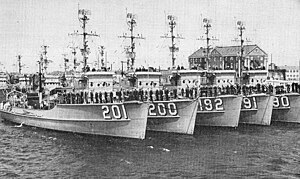USS Frigate Bird (AMS-191)
 Shrike (AMS-201), Redwing (MSC-200), Hummingbird (MSC-192), Frigate Bird (MSC-191), and Falcon (MS-190) at Charleston, South Carolina
| |
| History | |
|---|---|
| Name | Frigate Bird |
| Namesake | Frigate bird |
| Builder | Quincy Adams Yacht Yard, Inc., Quincy, Massachusetts |
| Laid down | 20 July 1953 |
| Launched | 24 October 1953 |
| Commissioned | 13 January 1955 |
| Reclassified | Coastal Minesweeper, 7 February 1955 |
| Stricken | 1 May 1976 |
| Identification |
|
| Fate | Transferred to Indonesia, 1971 |
| Name | Pulau Atang |
| Acquired | 1971 |
| Identification | Hull symbol: M-721 |
| Fate | sold for scrap, 1 September 1976 |
| General characteristics [1] | |
| Class and type | Template:Sclass- |
| Displacement | 290 long tons (290 t) |
| Length | 144 ft 3 in (43.97 m) |
| Beam | 28 ft (8.5 m) |
| Draft | 9 ft (2.7 m) |
| Installed power |
|
| Propulsion | 2 × screws |
| Speed | 13 kn (24 km/h; 15 mph) |
| Complement | 39 |
| Armament | 1 × twin 20 mm (0.8 in) Oerlikon cannons anti-aircraft (AA) mount |
USS Frigate Bird (AMS/MSC-191) was a Template:Sclass- acquired by the US Navy for clearing coastal minefields.
Construction
The second ship in the Navy to be named Frigate Bird, she was laid down 20 July 1953, as AMS-191; launched 24 October 1953, by Quincy Adams Yacht Yard, Inc., Quincy, Massachusetts; sponsored by Mrs. Matthew Gushing; and commissioned 13 January 1955, Lieutenant (jg) George B. Shick, Jr., in command. She was reclassified MSC-191 on 7 February 1955.[2]
East Coast operations
Joining Mine Force, Atlantic Fleet, at Charleston, South Carolina, 21 February 1955, Frigate Bird began a program of US East Coast and Caribbean training and experimental operations which continued through 1960. Among her activities were amphibious exercises on the beaches near Camp Lejeune, North Carolina, surveying ocean currents, testing a new type of can buoy, and taking part in fleet exercises of various types. From July 1958, she was homeported at Little Creek, Virginia, and served at frequent intervals with the Operational Development Force.[2] This minesweeper also participated in the Cuban Blockade in 1962.[citation needed]
Decommissioning
Frigate Bird was transferred to Indonesia in 1971, and renamed Pulau Atang (M-721); struck from the US Naval Vessel Register, 1 May 1976; and, disposed of through the Defense Reutilization and Marketing Service for scrap, 1 September 1976.[1]
Notes
- Citations
- ^ a b DANFS 2015.
Bibliography
Online resources
- "Frigate Bird II (AMS-191)". Dictionary of American Naval Fighting Ships. Naval History and Heritage Command. 9 July 2015. Retrieved 17 March 2017.
 This article incorporates text from this source, which is in the public domain.
This article incorporates text from this source, which is in the public domain. - "USS Frigate Bird (MSC-191)". Navsource.org. Retrieved 17 March 2017.
External links
- Photo gallery of USS Frigate Bird (AMS/MSC-191) at NavSource Naval History
